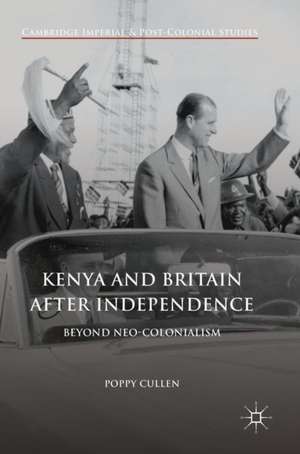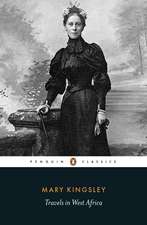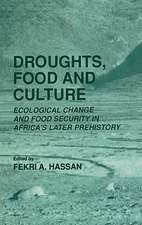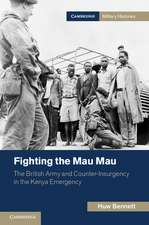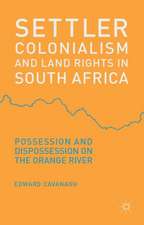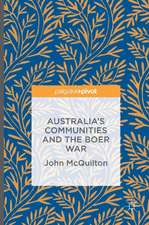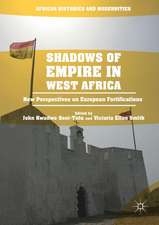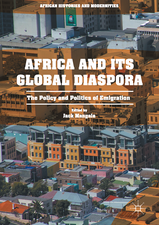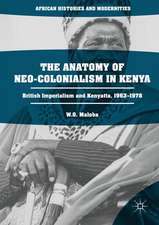Kenya and Britain after Independence: Beyond Neo-Colonialism: Cambridge Imperial and Post-Colonial Studies
Autor Poppy Cullenen Limba Engleză Hardback – 14 iul 2017
This book appeals to those interested in Kenyan history, post-colonial Africa, British foreign policy, and forms of diplomacy and policy-making.
| Toate formatele și edițiile | Preț | Express |
|---|---|---|
| Paperback (1) | 694.22 lei 6-8 săpt. | |
| Springer International Publishing – 14 aug 2018 | 694.22 lei 6-8 săpt. | |
| Hardback (1) | 699.45 lei 6-8 săpt. | |
| Springer International Publishing – 14 iul 2017 | 699.45 lei 6-8 săpt. |
Din seria Cambridge Imperial and Post-Colonial Studies
- 18%
 Preț: 894.46 lei
Preț: 894.46 lei -
 Preț: 280.10 lei
Preț: 280.10 lei - 20%
 Preț: 755.46 lei
Preț: 755.46 lei - 18%
 Preț: 774.83 lei
Preț: 774.83 lei - 18%
 Preț: 733.78 lei
Preț: 733.78 lei -
 Preț: 389.88 lei
Preț: 389.88 lei -
 Preț: 381.21 lei
Preț: 381.21 lei -
 Preț: 196.85 lei
Preț: 196.85 lei - 17%
 Preț: 491.68 lei
Preț: 491.68 lei -
 Preț: 386.10 lei
Preț: 386.10 lei - 15%
 Preț: 644.18 lei
Preț: 644.18 lei - 18%
 Preț: 782.87 lei
Preț: 782.87 lei -
 Preț: 389.70 lei
Preț: 389.70 lei - 15%
 Preț: 640.37 lei
Preț: 640.37 lei - 15%
 Preț: 500.73 lei
Preț: 500.73 lei -
 Preț: 396.40 lei
Preț: 396.40 lei -
 Preț: 390.63 lei
Preț: 390.63 lei - 15%
 Preț: 642.03 lei
Preț: 642.03 lei -
 Preț: 387.96 lei
Preț: 387.96 lei -
 Preț: 385.47 lei
Preț: 385.47 lei - 15%
 Preț: 640.37 lei
Preț: 640.37 lei -
 Preț: 390.63 lei
Preț: 390.63 lei -
 Preț: 389.88 lei
Preț: 389.88 lei -
 Preț: 385.08 lei
Preț: 385.08 lei - 15%
 Preț: 641.20 lei
Preț: 641.20 lei -
 Preț: 394.51 lei
Preț: 394.51 lei -
 Preț: 390.63 lei
Preț: 390.63 lei -
 Preț: 393.52 lei
Preț: 393.52 lei -
 Preț: 390.63 lei
Preț: 390.63 lei -
 Preț: 457.80 lei
Preț: 457.80 lei - 18%
 Preț: 1000.56 lei
Preț: 1000.56 lei - 15%
 Preț: 643.34 lei
Preț: 643.34 lei -
 Preț: 390.63 lei
Preț: 390.63 lei - 15%
 Preț: 699.93 lei
Preț: 699.93 lei -
 Preț: 384.70 lei
Preț: 384.70 lei - 18%
 Preț: 894.46 lei
Preț: 894.46 lei - 15%
 Preț: 645.79 lei
Preț: 645.79 lei - 15%
 Preț: 693.71 lei
Preț: 693.71 lei -
 Preț: 384.31 lei
Preț: 384.31 lei -
 Preț: 395.47 lei
Preț: 395.47 lei - 18%
 Preț: 1004.48 lei
Preț: 1004.48 lei - 15%
 Preț: 648.89 lei
Preț: 648.89 lei
Preț: 699.45 lei
Preț vechi: 822.87 lei
-15% Nou
Puncte Express: 1049
Preț estimativ în valută:
133.84€ • 140.09$ • 111.40£
133.84€ • 140.09$ • 111.40£
Carte tipărită la comandă
Livrare economică 01-15 aprilie
Preluare comenzi: 021 569.72.76
Specificații
ISBN-13: 9783319562759
ISBN-10: 3319562754
Pagini: 274
Ilustrații: XI, 272 p.
Dimensiuni: 148 x 210 x 20 mm
Greutate: 0.49 kg
Ediția:1st ed. 2017
Editura: Springer International Publishing
Colecția Palgrave Macmillan
Seria Cambridge Imperial and Post-Colonial Studies
Locul publicării:Cham, Switzerland
ISBN-10: 3319562754
Pagini: 274
Ilustrații: XI, 272 p.
Dimensiuni: 148 x 210 x 20 mm
Greutate: 0.49 kg
Ediția:1st ed. 2017
Editura: Springer International Publishing
Colecția Palgrave Macmillan
Seria Cambridge Imperial and Post-Colonial Studies
Locul publicării:Cham, Switzerland
Cuprins
Chapter 1. Introduction: From Mau Mau enemies to ‘best friends’.- Part I. Making Policy.- Chapter 2. British institutions and actors.- Chapter 3. Kenyan institutions and actors.- Part II. Policy-making and the Anglo-Kenyan relationship, 1963-1980.- Chapter 4. 1963-1964: Decolonising a difficult colony.- Chapter 5. 1965-1969: Ensuring a valuable relationship.- Chapter 6. 1970-1973: Negotiating benefits and challenges.- Chapter 7. 1974-July 1978: Waning relationships and interests.- Chapter 8. August 1978-1980: Succeeding with a new president.- Chapter 9. Conclusion: A ‘special’ relationship.
Notă biografică
Poppy Cullen is Teaching Associate in African history at the University of Cambridge, UK.
Textul de pe ultima copertă
This book explores British post-colonial foreign policy towards Kenya from 1963 to 1980. It reveals the extent and nature of continued British government influence in Kenya after independence. It argues that this was not simply about neo-colonialism, and Kenya’s elite had substantial agency to shape the relationship. The first section addresses how policy was made and the role of High Commissions and diplomacy. It emphasises contingency, with policy produced through shared interests and interaction with leading Kenyans. It argues that British policy-makers helped to create and then reinforced Kenya’s neo-patrimonialism. The second part examines the economic, military, personal and diplomatic networks which successive British governments sustained with independent Kenya. A combination of interlinked interests encouraged British officials to place a high value on this relationship, even as their world commitments diminished.
This book appeals to those interested in Kenyan history, post-colonial Africa, British foreign policy, and forms of diplomacy and policy-making.
This book appeals to those interested in Kenyan history, post-colonial Africa, British foreign policy, and forms of diplomacy and policy-making.
Caracteristici
Utilises extensive archival research to construct a persuasive narrative of Britain's evolving relationship with Kenya in the two decades after independence Contributes to wider debates about neo-colonialism and the nature of diplomatic relations between former colonies and colonizing powers in the years after independence Sheds new light on the continuing debate about neo-colonialism by integrating a study of policy-making with an exploration of British policies and priorities and Kenyan decisions and policies Includes supplementary material: sn.pub/extras
